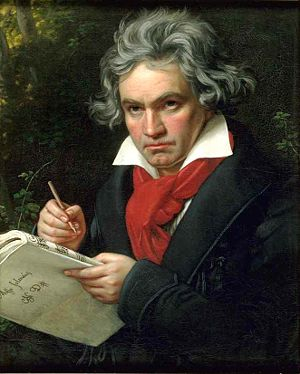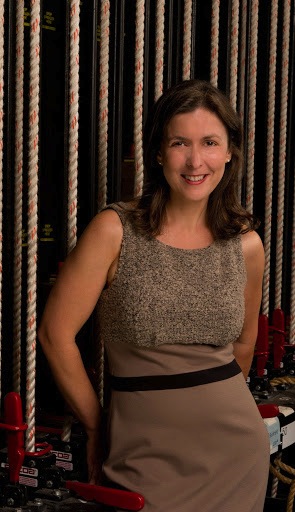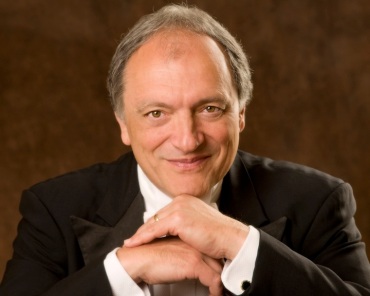The Well-Tempered Ear
Classical music Q&A: Stage director Tara Faircloth talks about her staging of Beethoven’s only opera “Fidelio.” The Madison Opera performs it this Friday night and Sunday afternoon.
Leave a Comment
By Jacob Stockinger
Political prisoners and prisoners of conscience are the hot topics of an old opera that is celebrating its bicentennial this year.
When you look around the world and see the struggle in fighting terrorism, religious intolerance and political tyranny as well as the difficult and thwarted stirrings of democracy in the Middle East, Africa and Asia, “Fidelio” — the only opera composed by Ludwig van Beethoven (below) — seems a timely and even inspired choice to stage.
That is exactly what the Madison Opera will do in Overture Hall of the Overture Center this Friday night at 8 p.m. and Sunday afternoon at 2:30 p.m. The opera will be sung in German with English supertitles.
Single tickets are $18-$125. Call (608) 258-4141 or visit the Overture Center box office.
Here is a link to more information, including a cast list and information about the production, which is based on the one done by the Michigan Opera Theatre in Detroit:
http://www.madisonopera.org/performances-2014-2015/fidelio/
A Madison Opera staged premiere, “Fidelio” is “a passionate ode to freedom, and the triumph of love over tyranny,” according to a press release from the Madison Opera.
“To rescue her husband, a political prisoner, the noblewoman Leonore (below, played by Alexandra LoBianco) disguises herself as a man and works at the prison where she believes her husband is held. Beethoven contrasts the evil of Don Pizarro, who has ordered his enemy imprisoned and starved, with the inner strength and bravery that enables Leonore to rescue her husband.
“Ranging from breathtaking arias to stunning choral music, Beethoven’s score is truly sublime, with an ever-building dramatic intensity that leaves audiences exhilarated. The famous “Prisoners’ Chorus” is one of the most beautiful choral tributes to freedom ever written, and one of the reasons Fidelio has resonated across the centuries.
“Madison Opera performed Fidelio in concert in November 1986, but this is the first time the company has presented the opera fully-staged. Sung in German with German dialogue and projected English translations, Fidelio is the only opera Beethoven ever wrote, premiering in its final form in 1814.
“Fidelio is a truly great opera,” says Kathryn Smith (below, in a photo by James Gill), Madison Opera’s General Director. “It has both light and dark moments, with real emotion underlying the intense drama. Above all, the score is a masterpiece from one of classical music’s greatest composers.”
“Fidelio” also marks the start of Madison Opera’s 10th season in Overture Hall, whose exceptional acoustics have been a primary factor in the company’s growth and success.
“It is absolutely thrilling for me to finally have a chance to conduct Beethoven’s operatic masterpiece,” says John DeMain (below, in a photo by Prasad), the Madison Opera’s Artistic Director and conductor who is also the music director of the Madison Symphony Orchestra. “I have loved this music passionately for years, and can’t wait to perform this great work in the acoustic splendor of Overture Hall. We have a thrilling cast of singers, the Madison Opera Chorus and the Madison Symphony Orchestra, all up to the demands of the mighty Beethoven.”
Pre-opera talks will be hosted by Kathryn Smith one hour prior to each performance.
Here is a background story, with more interviews, written by Mike Muckian that appeared in the Wisconsin Gazette.
http://www.wisconsingazette.com/music/fidelio-beethovens-struggle-madison-operas-reward.html
And here is an email Q&A that stage director that Tara Faircloth (below), who is making her Madison Opera debut, granted to The Ear:
Can you briefly introduce yourself, with some background and current activities as well as future projects and plans?
A Georgia native, I make my home in Houston, Texas, in a 1935 Art & Crafts bungalow that I am slowly renovating and restoring. I work primarily in opera, and take special pleasure in my work with young people: I am a semi-regular director at Wolf Trap Opera, and the dramatic coach for the fine singers in the Houston Grand Opera Studio.
Some of my most beloved projects have been a beautiful (if I do say so!) production of Igor Stravinsky’s The Rake’s Progress at Wolf Trap, a Dido & Aeneas with Houston’s Mercury Baroque in collaboration with the Dominic Walsh Dance Theater, and a very recent production of Claudio Monteverdi’s Il Ritorno di Ulisse at Rice University. I am very much looking forward to a new production of Peter Ilyich Tchaikovsky’s Eugene Onegin at the Arizona Opera, and my first Le Nozze di Figaro, by Wolfgang Amadeus Mozart, at the Atlanta Opera.
I like to create productions that are whimsical and humorous with intense moments of emotional connection.
How do you situate Beethoven’s “Fidelio” among other major opera and opera composers? What makes it special?
Fidelio is Beethoven’s only opera, a work that he re-wrote three times. It has been called a “secular oratorio,” and it is full of the passion that typifies so much of Beethoven’s work.
When listening to Beethoven’s music, I personally feel as if the score can barely contain all of the emotion he is trying to express, that it is stretched to its absolute limit, and somehow there is an underlying tension, a sense that if it were possible, he would want you to feel even more than he has been able to write down.
What is your overall concept of the opera? Do you see it as having to do with the Enlightenment and political movement toward democracy?
Fidelio has been subject to a multitude of interpretations since its inception. In many ways, the score is a blank slate: the characters are not described in great detail, there is no mention in the score of the exact political situation at hand, and even Florestan’s “crime” against Pizarro is not identified explicitly. Instead we have a story of brutal revenge versus great love: a universally appealing theme.
With its dream of a government free of tyranny, and the inherent worth of the individual man, Fidelio certainly has a very healthy dose of Enlightenment principles.
However, in many ways it may be seen as ushering in Romantic era ideals. It is full of sweeping emotional moments: perhaps the most famous is the Prisoners’ Chorus “O welche Lust” (at bottom in a YouTube video), which begins with an ecstatic appreciation of the beauty of a single breath of fresh air.
The fact that Beethoven gave the most beautiful music in the entire opera to a chorus of common prisoners shows us, I think, his belief that our connection to a higher power and our longing for freedom is inherent and universal to every man.
Does Beethoven’s opera hold lessons for today about current events?
As a director, I am not really one to look for lessons in our literature. Instead, I hope to engage our audience in a very human drama, to make them FEEL something and to connect with them. I think that experiencing music and drama in this way makes us more empathetic and open to other human beings, and that can only make the world a better place.
This is your debut in Madison. Do have impressions of the city, the opera and orchestra, either firsthand or through others?
I travel a lot for my work, and every time I have mentioned I will be in Madison, people simply gush about what a lovely place it is. In addition to the charming beauty of the city, I’ve noticed there seems to be a big focus on beer and cheese. So, basically it is heaven.
What you would you like to add or say?
Fidelio is an opera that is rarely performed. It takes massive forces: large orchestra, large chorus, and very large voices. I think we have quite a group assembled here, and hope your reading audience will take advantage of the opportunity to hear the work of one of the world’s most beloved composers.
Tags: Africa, Arizona Opera, Arts, Asia, Atlanta Opera, Beethoven, Classical music, democracy, Eugene Onegin, Fidelio, Houston, Houston Grand Opera, Jacob Stockinger, John DeMain, Ludwig van Beethoven, Madison, Madison Opera, Madison Symphony Orchestra, Marriage of Figaro, Middle East, Mike Muckian, Mozart, Music, Overture Center, political prisoners, prisoners of conscience, Romantic era, Stravinsky, Tara Faircloth, terrorism, Texas, The Enlightenment, The Rake's Progress, The Return of Ulysses, Wisconsin Gazaette, Wolf Trap, YouTube





